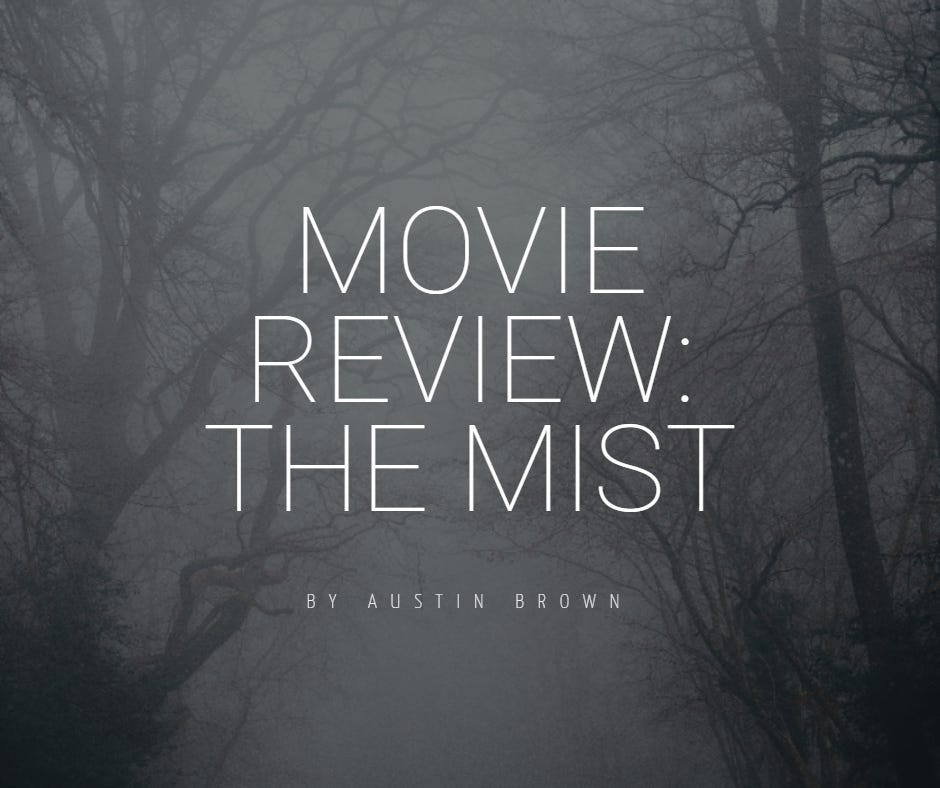Movie Review: Stephen King’s “The Mist” (2007)

By Austin Brown
Rarely has a film confounded my movie sensibilities so powerfully as Frank Darabont’s “The Mist.” Somehow and in some way it is simultaneously terrible yet entertaining, ridiculous yet strangely compelling, pedestrian yet brilliant.
No, scratch that last contrast.
It isn’t a brilliant movie. It flirts with brilliancy—plays footsie with it—like a pair of middle-schoolers who cannot truly reach the heights of love but mimic its form, perhaps even feeling like they’re swimming in love’s deeper currents.
And yet! I couldn’t stop watching it.
And yet! The ending is so shockingly poignant—so shockingly unexpected (at least for me)—that the last five minutes of the film very nearly absolved all the overwrought and bewilderingly unrealistic moments.
The film was released in 2007. So I’m quite late to the party. Were it not for the personal recommendation from Pastor Brito, the movie likely would have remained forever lost in the endless tunnels of Netflix. But there I was the other night, remote control in hand, the red ribbon of Netflix booting up on my TV, ready to be lost in a horror pick.
In many ways, it was the best of situations. I was sick with a lingering cold and knew next to nothing about the movie. All I had was the vague recollection of flappy, bat creatures terrorizing people in a grocery store from the trailer I had seen years earlier.
My faded memory proved accurate enough. In the aftermath of a nasty storm, a father and son go to a grocery store to restock various food items. Once there, a strange mist envelops the building leaving those trapped inside to decide their next play. Naturally, a little fog never hurt anyone, but various horrors are lurking about in the mist, just waiting to eviscerate the next hapless victim attempting to escape.
There are hints as to why all this is happening, but all that is tangential. The movie is fundamentally concerned with the interaction of (mostly) strangers from diverse backgrounds and worldviews trying to navigate a harrowing situation. In the same way that Signs wasn’t ultimately concerned about the visitation of aliens, this isn’t ultimately about flappy, bat creatures—deadly as they and their fellow minions prove to be.
This is precisely where the movie shines and very nearly flops. On the one hand, the acting and interactions are so questionable and poorly executed at times one should feel a strong urge to move on to better and brighter flicks. But then again, if you view it more as a theater play—one designed to be over-the-top—almost in a Job-esk dialogue kind of way (though not nearly so poetic)—I trust it can be forgiven, even appreciated.
Stated simply, it is intentionally grandiose and blunt.
The characters are not nuanced. The creatures are not nuanced. The setting is not nuanced. Everything is chiseled from the black and white ore of stark contrasts.
And yet, to stress the point again, somehow it works surprisingly well.
Some would no doubt want to pontificate upon the social and political undercurrents running through the film, but I’m not so inclined. They exist, but I think it would be a mistake to take it too seriously. The frame of the script cannot sustain the weight of such symbolism. Or perhaps it would be better to say that the effort of pontification should be reserved for more richly praiseworthy films.
This isn’t snobbery. It’s honesty and practicality. One dare not cheapen the enterprise of unearthing layered meaning and symbolism by hoisting “The Mist” up next to Lewis, Melville, or McCarthy. Popcorn is fine, but it isn’t especially nutritious.
In the end, the ending is what provides a beacon of bold light in an otherwise moderately entertaining fog. I truly love Darabont’s choice of conclusion. And from what I have gathered, even Stephen King said that had he thought of it, he would have done it.
Yet, for all that, I would not recommend the movie unless, of course, you have already seen most of the greats. If you have partaken of Forrest Gump, Whiplash, Band of Brothers, and Children of Men, for example, then please indulge in this fun horror romp on a foggy Friday night once the kids have gone to bed.
~~~~
Austin Brown is a mailman with a hunger for theology and writing. He had the good providence of marrying his high school sweetheart, Rebekah, is the father of three, and is an ordained ruling elder in the PCA. He’s also a nerdy gamer, a movie lover, and the author of various theological works and novels, including Walking with the Mailman. It’s true; there is scant fondness for canines in his heart.
The post Movie Review: Stephen King’s “The Mist” (2007) appeared first on Kuyperian Commentary.


